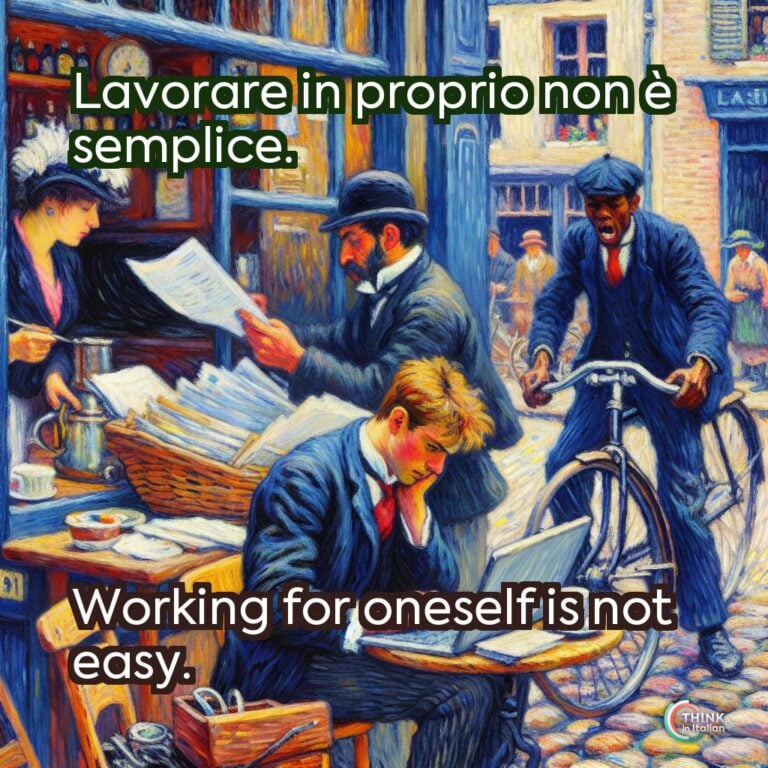“Proprio” in Italian
If you are studying Italian, I am sure you heard the word proprio in many conversations. “Proprio” is a very typical and common Italian word that is used with different meanings and in different contexts.
Sei proprio sicuro che tutti verranno con la propria macchina?
Are you really sure that everyone will come in their own car?
Linguistically speaking, proprio can either be an adverb or an adjective. In the first case, the word is invariable, while in the second case it must agree in gender and number with the noun it refers to.
So, let me show you all the different meanings of proprio so you’ll learn how to use it correctly.
How to use “Proprio” in Italian?
“Proprio” as an Adjective
The first use of proprio in Italian is as a possessive adjective that can replace both singular and plural third person. Singular third person forms are suo, sua, suoi, sue (his or her), while plural third person form is loro (their). When used this way, proprio can be translated as “one’s own“.
Of course, as you might have noticed already, there are four different words for the third person singular forms because, as I mentioned before, adjectives must agree in gender and number with the noun they refer to.
Giulia ama il proprio lavoro – Giulia ama il suo lavoro.
Giulia loves his own job.
Rimetti i piatti al proprio posto – Rimetti i piatti al loro posto.
Put the plates back in their (own) place.
If you use a third person possessive adjective instead of proprio you cannot clarify who or what the noun refers to. Therefore, using proprio makes the sentence clearer as to whom or what we are referring with the expression of possession.
For instance, take the first example I wrote with the possessive adjective:
Giulia ama il suo lavoro.
You might wonder: Whose job? Maybe Giulia loves her friend’s job, or maybe she loves Flavio’s job, or anyone else’s job.
While in English we add “own” to specify that the adjective refers to the subject, in Italian we use “proprio” to make sure the owner is not confused with someone else.
At the same time, proprio can also be used as a possessive adjective with impersonal constructions.
Si sta sempre bene a casa propria.
One always feels good at one’s own
Bisogna sempre dare la priorità al proprio benessere.
One must always prioritize one’s own well-being.
Notice! The word proprio as a possessive adjective is always preceded by an article unless it comes after the noun.
A casa propria.
At one’s own home.
Di produzione propria.
Of one’s own production.
“Proprio” as an Adverb
In its adverbial form, “proprio” can be used to mean really, just, or exactly, depending on the use. Of course, adverbs do not agree in gender and number, which makes the form “proprio” invariable despite the linguistic context.
- Really
Questo succo è proprio buono.
This juice is really good.
Non so proprio niente di storia.
I really don’t know anything about history.
- Just
Ho finito proprio ieri.
I finished just yesterday.
Ho chiamato Giulio proprio questa mattina.
I called Giulio just this morning.
- Exactly
Questo è proprio ciò che volevo.
This is exactly what I wanted.
Proprio così!
Exactly!
Sometimes, in English, you can also use “very” with the meaning of “exactly”. “Proprio” in Italian can stand as this as well:
L’ho conosciuto proprio il primo giorno di scuola!
I met him the very first day of school!
When used in a negative construction, it can be an intensifier meaning “at all”:
Questa pizza non mi piace proprio.
I don’t like this pizza at all.
Oggi non voglio proprio lavorare.
Today I don’t want to work at all.
Other Italian Expressions with “Proprio”
Proprio is used in many Italian colloquial expressions. These expressions are usually fixed: they do not vary and speakers use them in the way they are, always. Here I will show you some expressions you might want to know!
A proprio rischio e pericolo.
At one’s own risk.
Essere/sentirsi a proprio agio.
To be/feel at ease.
Amor proprio.
Self-esteem.
Lavorare in proprio.
To be self-employed.
Proprio Facile (Very Easy)
Now that you learned the different meanings and uses of “proprio”, I bet you have thought it is proprio facile. Make sure you read a lot, listen to Italian speakers, and engage in conversations, either with friends or our AI tutor, to practice its use as much as possible.
Proprio is a very versatile word and, as all untranslatable words, it is special to people who want to learn Italian. Learn how to use it and become as fluent as an Italian native speaker!




